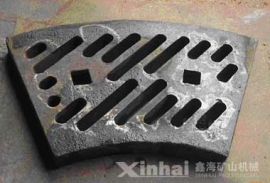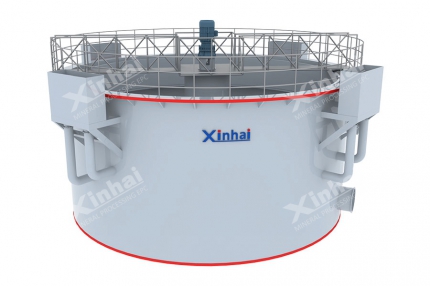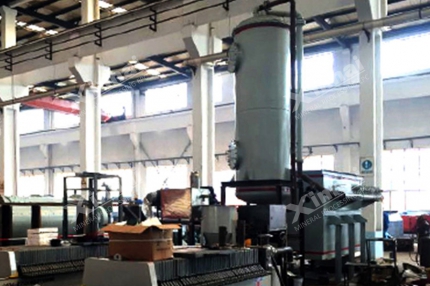Use the table of contents below to navigate through the guide:
01Introduction:
This project was a flat construction plant, which was located in northern Sudan. The design capacity was 700t/d, and the annual capacity was 210000 tons. The maximum particle size of the raw ore was up to 120 mm. Xinhai finally decided to adopt all-slime cyanidation CIP process, and the product was the primary smelting alloy gold.
1. Installation in the Pre-project
 Eequipment on the installation site
Eequipment on the installation site Installation of the filter shop
Installation of the filter shop Hoisting of the double impeller high efficient leaching tank
Hoisting of the double impeller high efficient leaching tank2. Project Process
This project process first adopted one stage opening crushing, one closed grinding process. Then the grinding product was treated with all-slime cyanidation CIP process, and the gold loaded carbon was sent to HTHP desorption electrolysis system for gold extraction, finally the gold mud became the alloy gold, and the gold mud was stored by the dry stacking after tailings leaching and filtering dewatering.

One closed grinding adopted pump + hydrocyclone closed process, the grinding stage adopted one MQYg2400 x 6000 cylinder energy-saving overflow ball mill, the classification stage used a group of XCⅡ-φ250 x5 hydrocyclone unit, -200 mesh of the grinding fineness accounted for 80.00%;

The concentration of the overflow product reduced to 40% after concentrated by NZSG-15 efficient improved thickener, and the overflow product was sent to double impeller high efficient leaching tank by slurry pump.
 Group photo on the site
Group photo on the site3. Smelting of the Gold Ingot
At present, the installation and debugging work have been almost completed. Xinhai engineers sent a set of precious pictures to us, which recorded the whole gold smelting process during the debugging period:
First: Washed the gold mud
After the disruption electrolysis process, the gold mud was obtained. Open the electrolyzer and remove the positive and negative plate, wash off the gold mud from the plate, and add the flocculant, then store them for sediment.

The gold mud and normal mud often look similar; Xinhai engineer extracted the gold mud meticulously.
Second: Dried off
After bailing, the gold mud stored together for drying off, then took them off and put them in the container.
Third: Smelted
Smelting basis: The gold has different chemical property from other metals, and has different proportions from copper lead and zinc, which are beneficial to separate the gold from the waste residue.
Preparation: Before smelting, please add the anhydrous borax, sodium nitrate, glass and sodium carbonate to the gold mud, then mix them well.
Process: Opened the cold pump, put the mixed gold mud into the crucible, and then turned on the high-frequency furnace, heated up. When all solid became the liquid, took them with the crucible tong, and poured into the gold mold. The proportion of slag was only 2.5~3, which much lower than the proportion of gold and silver (gold19.32, silver10.5), so the slag floated on the top then removed easily. After cooling molding, removed the waste residue and take out the molding gold ingot.

Xinhai people achieved the promise of "designed capacity reached".


 marketing@ytxinhai.com
marketing@ytxinhai.com  0086 13810327080
0086 13810327080 






































































































 CHAT
CHAT MESSAGE
MESSAGE










